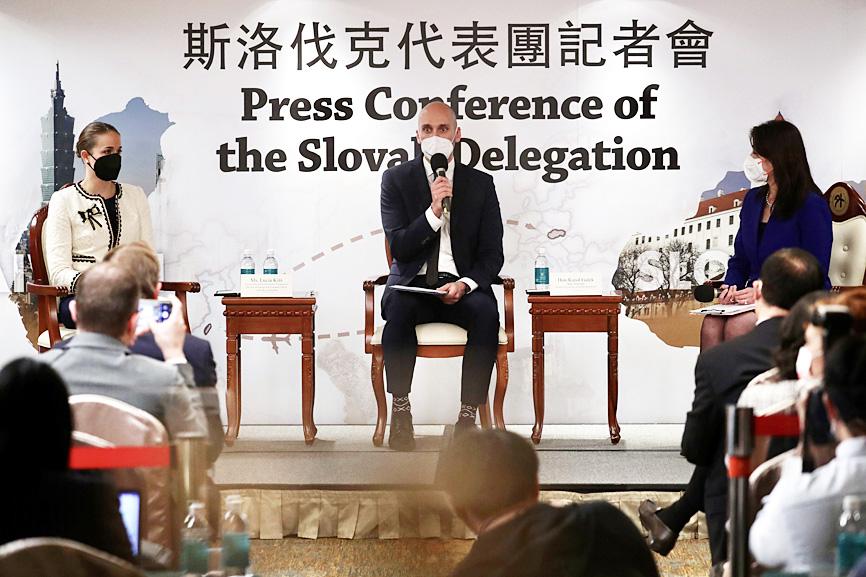Taiwan is the global leader in semiconductors and Slovakia’s second-largest investor from Asia, a delegation of Slovak officials said yesterday, adding that the visit is economic — and not political — in nature.
The 43-person delegation is to leave Taiwan today, concluding their five-day visit.
“Taiwan is an important part of our future economic diplomacy,” Lucia Kiss, director-general of economic and development cooperation at the Slovak Ministry of Foreign and European Affairs, told a news conference at the Sherwood Taipei.

Photo: Ritchie B. Tongo, EPA-EFE
Bilateral relations are not something new since the two sides established economic ties in 2003, she said, adding that the visit’s aim was to expand existing cooperation.
“This visit is an economic one, not a political one,” and is a continuation of our cooperation since 2003, she said.
Asked if the group faced any pressure from Beijing, she said: “This relationship is built on economic partnership and values.”
“The EU has an agreed common approach toward China, based on three pillars. We see China as a partner, as a competitor and as a systematic challenger,” she said.
Asked if Slovakia should brace for similar actions faced by Lithuania, with Beijing implementing political and economic sanctions for boosting ties with Taiwan, Kiss said: “There is no reason for that.”
“Any problems that a [EU] member state faces, we all face, and we all have to deal with them. It is really unfortunate ... and Slovakia feels solidarity with Lithuania,” she said.
Taiwan is Slovakia’s second-largest Asian investor, Slovak Second State Secretary of Ministry of Economy Karol Galek said.
Many Taiwanese companies, such as Foxconn (富士康), Delta Electronics Inc (台達電) and AU Optronics Corp (友達光電), have set up operations in Slovakia, with Taiwanese investments totaling 500 million euros (US$566 million) and creating 3,000 jobs, he said.
“Taiwan is the global leader in semiconductors,” laying the critical foundation for digital infrastructure, he said.
The Slovak officials also said they hoped to boost cooperation in other areas, including electric vehicles (EV), space technology, smart city, science parks and renewable energy.
Galek and some delegation members visited the Ministry of Science and Technology, Hsinchu Science Park Administration Bureau, National Space Organization and Taiwan Semiconductor Research Institute.
The world’s biggest vehicle producer per capita, Slovakia has four auto companies that also make electric and hybrid vehicles, Galek said.
Semiconductors are vital to EV development, he added.
Slovakia is also eyeing further cooperation with Taiwan in space technology, such as developing small satellites, he said.
Taiwan is good at connecting local universities and industry through science parks, and Slovakia hopes to learn from Taiwan as it does not have such a platform, he said.
The delegation and their Taiwanese counterparts inked nine memorandums of understanding to promote cooperation in talent exchanges, research and development and innovation, science parks, space technology, tourism, smart city and scientific research, the Ministry of Foreign Affairs said.
The two sides yesterday also inked a Protocol of the first Session of the Taiwanese-Slovak Commission on Economic Cooperation to lay the foundation for future cooperation, with the next session set to take place in Bratislava next year, it said.

‘DENIAL DEFENSE’: The US would increase its military presence with uncrewed ships, and submarines, while boosting defense in the Indo-Pacific, a Pete Hegseth memo said The US is reorienting its military strategy to focus primarily on deterring a potential Chinese invasion of Taiwan, a memo signed by US Secretary of Defense Pete Hegseth showed. The memo also called on Taiwan to increase its defense spending. The document, known as the “Interim National Defense Strategic Guidance,” was distributed this month and detailed the national defense plans of US President Donald Trump’s administration, an article in the Washington Post said on Saturday. It outlines how the US can prepare for a potential war with China and defend itself from threats in the “near abroad,” including Greenland and the Panama

The Chinese Nationalist Party (KMT) is maintaining close ties with Beijing, the Democratic Progressive Party (DPP) said yesterday, hours after a new round of Chinese military drills in the Taiwan Strait began. Political parties in a democracy have a responsibility to be loyal to the nation and defend its sovereignty, DPP spokesman Justin Wu (吳崢) told a news conference in Taipei. His comments came hours after Beijing announced via Chinese state media that the Chinese People’s Liberation Army’s Eastern Theater Command was holding large-scale drills simulating a multi-pronged attack on Taiwan. Contrary to the KMT’s claims that it is staunchly anti-communist, KMT Deputy

RESPONSE: The government would investigate incidents of Taiwanese entertainers in China promoting CCP propaganda online in contravention of the law, the source said Taiwanese entertainers living in China who are found to have contravened cross-strait regulations or collaborated with the Chinese Communist Party (CCP) could be subject to fines, a source said on Sunday. Several Taiwanese entertainers have posted on the social media platform Sina Weibo saying that Taiwan “must be returned” to China, and sharing news articles from Chinese state media. In response, the Mainland Affairs Council (MAC) has asked the Ministry of Culture to investigate whether the entertainers had contravened any laws, and asked for them to be questioned upon their return to Taiwan, an official familiar with the matter said. To curb repeated

Myanmar has turned down an offer of assistance from Taiwanese search-and-rescue teams after a magnitude 7.7 earthquake struck the nation on Friday last week, saying other international aid is sufficient, the National Fire Agency said yesterday. More than 1,700 have been killed and 3,400 injured in the quake that struck near the central Myanmar city of Mandalay early on Friday afternoon, followed minutes later by a magnitude 6.7 aftershock. Worldwide, 13 international search-and-rescue teams have been deployed, with another 13 teams mobilizing, the agency said. Taiwan’s search-and-rescue teams were on standby, but have since been told to stand down, as